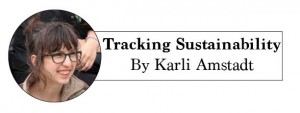I spend my Friday afternoons digging through students’ discarded apple cores, half-eaten sushi and greasy pizza boxes. No, this isn’t my desperate attempt to compensate for the fact that I am on the small meal plan this semester. I spend my Friday afternoons sorting through the compost because it’s a program that would fall to the wayside without the help of dedicated students.
The compost program was initiated and led by Ohio Wesleyan’s former sustainability coordinator, Sean Kinghorn. Sean, along with the sustainability coordinator intern, two recycling interns and student volunteers, sorted through the compost twice a week, removing any items that were not compostable. If any given bag of compost contains more than five percent non-compostable materials then the university will be charged. However, if we compost effectively, it saves the university big bucks because we pay for our garbage pickup by weight, whereas our compost pickup is done free of cost.
Now, the grant money that funded the sustainability coordinator has run out, and the university has chosen not to renew the position. The sustainability coordinator intern and the two recycling intern positions have also been terminated. The effects of these absences are already being felt. The recycling bins that used to dot Rowland Avenue have disappeared. Clearly, we need to move to permanent structures, positions and protocol so that sustainability will be worked into the fabric of our university instead of relying on projects that may or may not be sustained in the long-term.
Additionally, the May Move Out and OWU Free Store programs will go to the wayside in the absence of a sustainability coordinator. This program collects the abundance of discarded items that students aren’t able to take home at the end of the year. In a span of just two weeks, this program diverted 43 tons of waste in 2012. Not only did this save the university the cost of waste pick-up but it saved students money as well because all the collected items went to the OWU Free Store, where students were able to pick up clothes, books, school supplies and dorm décor free of cost.
Amongst all these losses we do have a glimmer of hope in that the two new composting interns, Ellen Hughes and Erika Kazi, will maintain the composting program. But everything is not running smoothly. The first week was a scramble to get all the compost sorted by pick-up time and it was only narrowly completed. While- the Hamilton-Williams Food Court was headed in the direction of waste diversion, this process has been stalled with the addition of Papa John’s. Unfortunately, Chartwells signed a contract requiring them to use Papa John’s pizza boxes, which are not compostable or recyclable. The composting program diverts about 30 tons of waste annually but we could easily divert more than 60 tons a year if we used all compostable containers and if the student body learned to compost effectively. Couldn’t we have added a greener, perhaps local, pizza company to the Food Court instead?

Students are not consulted with these kinds of decisions, but they shouldn’t have to be. This serves as a prime example of why we need a full-time sustainability coordinator making sure that all of Ohio Wesleyan’s new programs, initiatives, and renovations are done in a sustainable manner. Without this position sustainability is put on the back burner and we are already feeling the effects of Sean’s absence. While schools with permanent sustainability coordinators like Kenyon, Denison, Otterbein and Wooster, to name a few, are working towards a solution to global climate change, Ohio Wesleyan seems to be taking one step forward and one step back.
